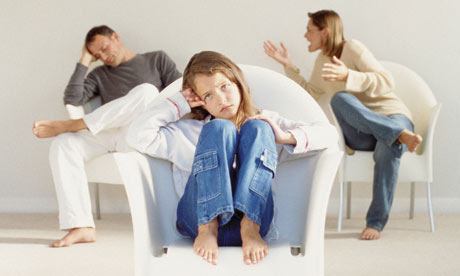
When you don't have children - as I don't, thus far - one entertaining thing to do with friends who do is as follows. Wait until they're gazing, lovestruck, into the eyes of their newborn baby, tucking their toddler into bed or proudly watching their 21-year-old graduate. Then creep up behind them, slap down a copy of the Journal Of Marriage And Family, vol 65, no 3, and triumphantly declare: "Ha! You may think parenthood has changed your life for the better, but, in fact, the statistical analyses contained herein, along with numerous other studies, demonstrate conclusively that having children makes people, on average, slightly less happy than before!" Then walk away cackling. They may never speak to you again, but that won't matter: you will have won the argument, using Science.
Here's the thing, though: the studies really do suggest "having children does not bring joy to our lives", as Nattavudh Powdthavee, of York University, put it in a recent overview of the research, published in the Psychologist. (Read it at tinyurl.com/ccudqp.) For most people, parenthood leads to no increase, or a decline, in satisfaction - a finding so counterintuitive that a common response is to assume the studies must be flawed. But there's little mileage in attacking the methodology, which often involves asking thousands of people, repeatedly over years, to rate their overall satisfaction with life. Some may be bad at recalling how happy they've been recently; some may lie. But there's no reason to think that would skew the results against parenthood: if anything, the taboo against admitting to regretting having kids may push things the other way.
What makes us so certain that parenthood will make us happy, Powdthavee argues, is the "focusing illusion": contemplating any major life change, we overrate the effect it will have. We imagine living idyllically after making millions; in fact, wealth leaves most people unchanged. Or we move cities, convinced that location is everything. (Classic Onion story: "All of area resident Brian Shepard's problems, including his fear of commitment, lack of personal direction and inability to learn from past failures, will be instantly solved this week when the 29-year-old moves to a new city.") Besides, the belief that children make us happy is what the psychologist Daniel Gilbert calls a "super-replicator": civilisation depends on it, and those who disagree tend not to have kids, so their views don't percolate down the generations.
More intriguing to me, though, is how many parents insist parenthood is fulfilling. Assuming they're telling the truth, and assuming the life-satisfaction studies mentioned above aren't bunkum, this raises mind-bending possibilities. Are fulfilment and satisfaction fundamentally different? We know fulfilment's different from pleasure, obviously: most things worth doing - child-rearing included - aren't
24-hour fun. But the researchers weren't asking about fun; they were asking about life-satisfaction. Suppose you're a parent whose survey response showed you were less satisfied than when you weren't a parent. Now suppose someone else asks you if parenthood is fulfilling, and you glow with conviction as you answer yes. Which response is the more "true"? I'm baffled. I have no idea. And I fear there's only one way to find out.
oliver.burkeman@theguardian.com

